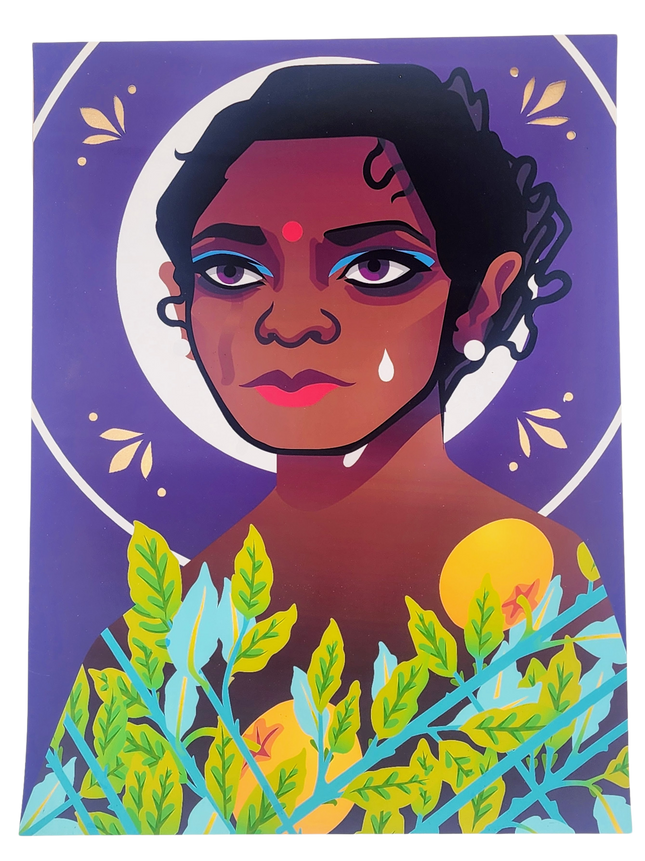
Wes Anderson

Kevin Stanton Rita Gold Hand Cut HPM Giclee Print by Kevin Stanton
Rita Gold Hand Cut HPM Spray Paint Giclee Print by Kevin Stanton Artwork Limited Edition Print on Layered Glitter Fine Art Paper Hand Embellished Print Graffiti Pop Street Artist. 2013 Signed & Numbered Spray Paint Glitter Paper Hand Cut Embellished Limited Edition of 4 Artwork Size 11.75x15.75 HPM Giclee Print. Gold Paper Collage of THE Woman Amara Karan From India & Movie The Darjeeling Limited Stylized Look. Kevin Stanton's "Rita Gold": A Harmony of Tradition and Innovation Kevin Stanton's "Rita Gold" stands as a profound expression of creativity and cultural homage within the modern art scene, particularly within the genres of Street Pop Art and Graffiti Artwork. This piece is a hand-cut HPM (hand-painted multiple) Giclee print. This limited edition fuses traditional paper-cutting techniques with the contemporary flair of spray paint and the luxury of a gold paper collage. Released in 2013, "Rita Gold" is an exclusive series with only four signed and numbered prints. Each piece measures 11.75x15.75 inches and is presented on layered glitter fine art paper, further hand-embellished by the artist. The work reflects Stanton's intricate paper-cutting skills, a foundational aspect of his artistic journey that shapes his systematic approach to composition—prioritizing the form and silhouette before the detail of line. Capturing Cultural Essence Through Cut-Paper Artistry "Rita Gold" is a celebration of Indian aesthetics, depicted through the stylized portrayal of a woman whose gaze and posture exude a sense of contemplative serenity. Stanton's use of gold paper collage works with hand-embellishments to elevate the artwork, infusing it with a tactile depth that cannot be replicated by digital means alone. The contrast between the reflective gold elements and the matte textures of the spray-painted background creates a dynamic visual experience that draws the viewer into a deeper engagement with the piece. The artwork's layered composition is a nod to the complexity of Indian culture and its rich tapestry of symbols, colors, and historical references. Stanton's work delves into storytelling through visual cues, where each cut and hue is a deliberate choice meant to convey meaning and provoke thought. Blending Fine Art with Street Art Sensibilities Street pop art and graffiti artwork are often characterized by their public accessibility and vibrant immediacy, qualities that Kevin Stanton skillfully incorporates into "Rita Gold." By choosing to work on a small scale and with a limited edition series, Stanton bridges the typically vast and open-ended world of street art with the exclusivity and intimacy of fine art. This piece embodies the versatility and adaptability of street art influences when placed in the hands of an artist who respects the medium's history while pushing its boundaries. The hand-cut elements and spray paint application are reminiscent of the graffiti artist's stencil and can technique, yet the final product is more delicate and refined. Kevin Stanton: An Artist of Precision and Passion Kevin Stanton's commitment to his craft is evident in the meticulous execution and thoughtful presentation of "Rita Gold." His dedication to blending traditional art forms with modern techniques makes his work stand out in a crowded field of contemporary artists. The limited nature of this print series speaks to his artwork's exclusivity and bespoke quality, ensuring that each piece is not merely a visual spectacle but also a collector's item. Stanton's "Rita Gold" is more than a print; it is a testament to the power of art to transcend cultural barriers and to resonate with a universal audience. The print remains a captivating piece within Stanton's oeuvre, capturing the essence of street pop art and graffiti artwork through a unique lens that is both innovative and respectful of its diverse influences.
$150.00


